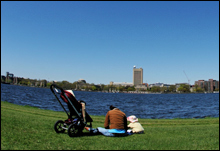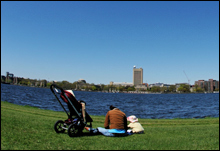On a snowy winter morning five years ago, after four days of cocooning in the hospital, I walked home carrying my newborn daughter. I knew I was crossing the threshold into life as a mother, caregiver, and working parent. What I didn’t know was that I was about to become a different kind of environmentalist.
It took just a few blocks to transform my environmentalism from one based on vehement philosophical and political beliefs to one grounded in the humility of everyday experience. And it took just a little while longer for me, armed with a newfound sense of constituency, to realize the potential power of mothers to change the world as we know it.

Oh baby, baby, it’s a wild world.
Since college, my concern for the planet had been driven by idealistic beliefs: Every child should grow up in a healthy, thriving community with clean air and water, great public schools, and adults who care about them. We should support walkable communities and stop driving so much, polluting the air, and developing farmland while city neighborhoods are left to die. Governments and companies should invest in the cleanest technologies possible, instead of holding on for dear life to polluting ones that save short-term bucks and create long-term costs. You get the idea.
In my daily life, I made choices aligned with my values, from composting to letting my driver’s license expire; from obsessively lowering the thermostat to choosing to live in a multiracial, mixed-income, mixed-use neighborhood. The last choice is what made it possible for me to walk to the hospital, in labor, when my first child was born, then walk back with my baby in tow.
After I carried home that six-pound bundle of alert eyes and chubby thighs, the activist in me began to morph into something altogether different. As I waded through the shoals of sleep deprivation, my environmentalism became less about ideas and opinions, and more about practicalities and concrete concerns. With the birth of my second child — another walk-up delivery — my convictions only strengthened. I was petrified by the vision of microscopic toxins creeping into the cells of my two vulnerable babies, then lying in wait to diminish their lives.
Environmentalism was no longer a general belief wafting in the ether of my life, but an absolute operational imperative. I had cared about sustainable agriculture before having kids, but now I was hypervigilant about buying organic produce and dairy. Instead of letting the scrubbing bubbles do the work for me, I huffed and puffed to clean the tub with baking soda. My kids begged for fluorescent-blue Bugs Bunny toothpaste, but got stuck with the natural variety instead. And occasionally I flew into fits of mild hysteria over minor infractions by my less-than-vigilant spouse. (Of course, as a working mother with a husband who travels, I also came to a much deeper understanding that consumer choices are not always about commitment to progressive values. Every harried parent in the world knows that good intentions cower in the face of reality, and we do whatever we must to get through the day; if it means using disposable wipes or letting kids go through a sheaf of paper to keep them occupied, well, that’s life.)
As I weaved and bobbed toward this new way of living, I realized I couldn’t be the only one. If the authors of “The Death of Environmentalism” are right that connecting to deeply held values is the way to voters’ hearts, I have advice for environmental leaders across the land: start talking to mothers!
Now, I know some people think those of us who are parents are leading the march to environmental ruin by overpopulating the globe. But the reality is people are not going to stop having children. And if mothers could transform the nation’s consciousness around the issue of drunk driving, think what they can do for the environment. If one mother could change the face of Love Canal, think what a mass movement could do for the country.
If mothers in the wild will do anything to protect their young, imagine the political power of mothers across the land driven by the obsession to protect their children, to create the best possible communities and opportunities for them. Since women hold an overwhelming percentage of household purchasing power, what kind of economic forces would be unleashed through their enthusiastic support for sustainable and child-labor-free products? How might a more holistic, mom-friendly definition of “environment” — one akin to the environmental-justice movement’s understanding of it as the places where we live, work, play, learn, and worship — contribute to the framing of these issues?
Soccer moms may be a desirable demographic, but enviro moms could be a constituency with a mission and a message: Create a better world for my children and our communities, fast, or I’ll kick your (political) butt.
I don’t mean to leave concerned fathers out of this equation. At the moment, however, mothers are a political constituency largely ignored in this battle — despite the solid presence of women as volunteers and staff members in the environmental, sustainability, environmental-justice, and conservation movements. If the leaders of those movements can demonstrate to all mothers — not just upper/middle-class, white, suburban ones — that an environmental agenda is about making their kids and communities safer, healthier, and more likely to thrive, there are millions of moms across the U.S. who could carry the banner of activism.
These leaders may think they’re already speaking our language, but it’s not coming through. The messages that do translate are simplistic. My best friend is a progressive mom who does exactly what she hears the green movement asking her to do: recycles her bottles and cans. If there is something else enviros expect from her, she ain’t hearin’ it. And the big values-driven, political train enticing her to jump aboard is nowhere in sight.
So what’s the best way to kick-start this new movement? Well, mainstream environmental groups should take advantage of their funding and visibility to help families understand why these issues matter. But ultimately, a mass movement of moms needs to be started by moms — just as Mothers Against Drunk Driving was, on its way to changing laws in every state in the nation.
The one large-scale effort I know of along these lines, Mothers and Others for a Livable Planet, seems to have closed up shop. While that group did admirable work educating parents and communities about environmental choices, its focus was on consumer products and the home. I believe it’s time to move to the next level. A new, politicized, national movement could contribute to reshaping and reframing environmentalism to appeal to broader constituencies — including, but not limited to, those with maternity clothes in their closets.
Five years ago, I took a walk that took me a few blocks and a world away. On this Mother’s Day, I salute my fellow travelers on the grueling and life-altering road of motherhood. We may occasionally be haggard, grumpy, and multi-tasked near death, but I believe we hold a key to environmental victory.
Now if only one of us had the energy to get this thing started.



